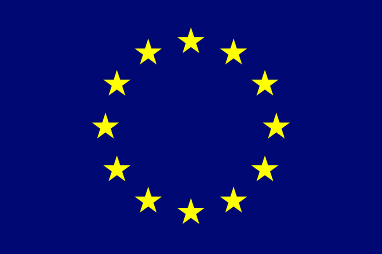Publications
Throughout the year, VOICE produces and disseminates key documents reflecting on humanitarian aid issues at the EU level and from an NGO perspective. They are addressed to decision-makers within the European institutions, at the National level, to NGO networks and other stakeholders of the humanitarian community, as well as to the VOICE members. Some documents are produced by the VOICE Secretariat with the support of VOICE members while others are publications from members and other key stakeholders in the humanitarian sector.
Please note that members-only documents will not be visible unless you are logged in.
-
Participatory Resilience Analysis and Measurement Tool - Guidance Document ACF
01 July 2021Members' publicationsThe Participatory Resilience Analysis and Measurement (PRAM) tool was born of the desire to be able to assess, measure and track changes in the resilience levels of households and communities that participate in Action Against Hunger’s targeted disaster prevention and resilience, and nutrition security interventions. Measuring changes in resilience is considered a key element to understanding how resilience manifests itself in different contexts, and can provide a basis for understanding the drivers of resilience in the most vulnerable communities, and therefore how best to address the root causes of vulnerability. -
Inclusive practices for disaster risk management
04 January 2021Members' publicationsThe document gathers 12 experiences of Inclusive Disaster Risk Management Practices identified from social actors and government entities in 6 countries of the Latin American region. For each practice identified, the context, the description of the practice, its impact, its potential for replication and sustainability as well as the challenges for the future were documented. -
At What Cost: How chronic gaps in adaptation finance expose the world’s poorest people to climate chaos
06 August 2020Members' publicationsThe impacts of climate challenges are not inevitable. This report of the Zurich Flood Resilience Alliance with main partners Concern Worldwide and Mercy Corps deals with the financing of two existing measures – climate change adaptation and disaster risk reduction – to better manage and reduce the risk of climate-related disasters and enable people to cope with multiple shocks and stresses. -
VOICE out loud 30 - Humanitarian Action in the Era of Climate Change
05 August 2020VOICE out loudIn this edition of the VOICE out loud, VOICE members explore the effects of the climate crisis on humanitarian action and share how humanitarian NGOs are working to address them. -
Risk-informed approaches to humanitarian funding: Using risk finance tools to strengthen resilience
18 May 2020ECHO commissioned this study to explore the role that pre-arranged financing can plan in reducing or mitigating disaster impacts by supporting anticipatory action and response. The study terms of reference state the objective is: “to assist DG ECHO in developing approaches to mainstreaming risk-based financing and specific risk financing tools for reducing the impact of disasters, decreasing overall ex-post humanitarian funding and enhancing preparedness”. -
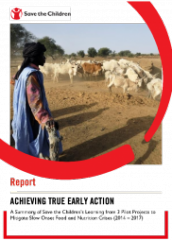
Achieving True Early Action: A summary of Save the Children's learning from 3 pilot projects to mitigate slow onset food and nutrition crises (2014-2017)
13 December 2018Members' publicationsIn many countries, resilience and development gains continue to be undermined by recurrent, predictable slow onset food and nutrition crises. Despite early warning signs, the humanitarian community is slow to react, only after lives and livelihoods already have been lost. In an attempt to battle this problem, Save the Children UK has been investing in internal financial and technical resource toward early action. This means reacting to forecasts of a potential crisis before it has escalated to be defined as such.
This document draws on the findings of an external evaluation and internal reviews and analysis to consolidate the learnings of three Early Warning projects. The report is aimed at NGOs, donors, and governments who would like to learn how we can better institutionalize early action responses in countries that are susceptible to slow onset crises. -
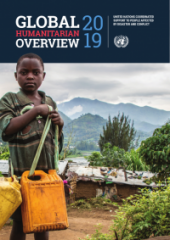
Global Humanitarian Overview 2019
13 December 2018We are witnessing extremely high levels of humanitarian need even as global wealth is higher than ever before. This year’s Global Humanitarian Overview (GHO) therefore provides, for the first time, an analysis not just of how many people need humanitarian assistance, but a clearer understanding of why.
The humanitarian response plans outlined in this year’s GHO are the result of in-depth, country-by-country analysis of the most comprehensive data available. Funding requirements are projected to be comparable to last year. While some crises have escalated, this year we also have better prioritization of the most vulnerable and severely affected people, and a stronger coordination with development partners to ensure a focused humanitarian response.
Despite the challenges, the humanitarian system is more effective and impactful than it has ever been. We are better at identifying different groups’ specific needs in crises and quicker to respond when disasters strike. Response plans are more inclusive, comprehensive, innovative and prioritized. We have a better picture of needs and vulnerabilities. And we have dedicated networks in more than 20 countries to protect people from sexual exploitation and abuse. All of these factors allow us to design effective responses that save lives and protect livelihoods.
-
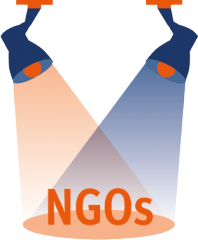
NGO Statement to the Somalia Partnership Forum in Brussels
17 July 2018Members' publications -
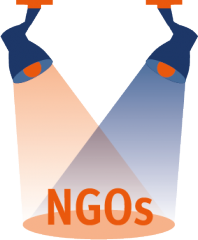
NGOs Statement - Comprehensive Response to Drought in Afghanistan
10 July 2018Members' publications -
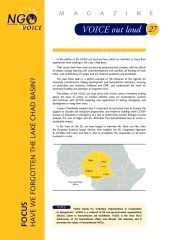
VOICE out loud 27 Have we forgotten the Lake Chad Basin?
29 May 2018VOICE out loudThis edition of the VOICE out loud explores the situation in the Lake Chad Basin. We have asked our members in ACTED, Accion contra el Hambre, COOPI, DRC, Concern Worldwide to share their experiences about this complex and proctracted crisis. -
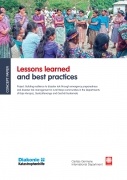
Lessons Learned and Best Practices in Guatemala: Disaster Risk Reduction activities in Central America
25 January 2018Members' publicationsDisaster risk reduction (DRR) is understood as “the application of disaster risk reduction policies and strategies to prevent new disaster risk, reduce existing disaster risk and manage residual risk, contributing to the strengthening of resilience and reduction of disaster losses” (UNISDR).
A new publication is the result of the joint cooperation of the Protestant organization Diakonie Katastrophenhilfe, its Catholic counterpart Caritas Germany and the Federal Ministry of Foreign Affairs of Germany. It is based on the experiences gained from 2015 to 2017 in the project “Building resilience to disaster risk through emergency preparedness and disaster risk management in rural Maya communities in the Departments of Baja Verapaz, Quetzaltenango and Quiché, Guatemala”.
The document compiles relevant information for DRR-projects in Central America in form of lessons learned and best practices, with the aim of benefiting projects to be designed in the coming years.
-
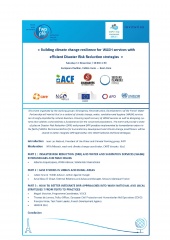
Building climate change resilience for WASH services with efficient Disaster risk Reduction strategies
06 November 2017This event, organised by the working group " Emergency, Reconstruction, Development" of the French Water Partnership, will remind that, in a cotext of climate change, water, sanitation and hygiene (WASH) services are strongly impacted by natural disasters. This event will provide a state of play on Disaster Risk Reduction (DRR) and present DRR practices implemented by humanitarian actors in the field of WASH. -
Handicap International Policy Paper: Inclusive Disaster Risk Reduction
24 July 2017Members' publicationsSince 2001, Handicap International has been supporting strategies that empower communities and local institutions to prepare for, reduce the impact of, and respond to disasters and, in the long-term, increase their resilience. Their objective and added-value is also to ensure that these strategies are inclusive, enabling the most at-risk groups, and especially people with disabilities, to become actors in risk reduction and to benefit from protection. -
EU Member States’ policies and practice: Disaster Risk Reduction in humanitarian assistance and development cooperation
21 June 2017VOICE studies and briefing papersThis study highlights DRR policies and programming of a selection of EU Member States and presents recommendations for the further elaboration of their policy work on Disaster Risk Reduction. -
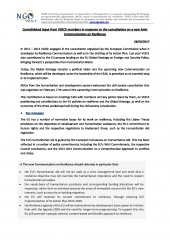
VOICE response to civil society consultation on new Resilience Communication
02 March 2017VOICE position papersIn 2012 – 2013 VOICE engaged in the consultation organised by the European Commission when it developed its Resilience Communication as well as in the drafting of its Action Plan. Last year VOICE also contributed to the EU process leading to the EU Global Strategy on Foreign and Security Policy, bringing forward a perspective from humanitarian NGOs.
Today, the Global Strategy remains a political vision and the upcoming new Communication on Resilience, which will be developed under the leadership of the EEAS, is perceived as an essential step in its implementation.
NGOs from the humanitarian and development sectors welcomed the civil society consultation that was organised on February 17th around the upcoming Communication on Resilience.
This contribution is based on meetings held with members and key points raised by them, on VOICE positioning and contributions to the EU policies on resilience and the Global Strategy, as well on the outcomes of the three workshops held during the civil society consultation. -
Hotter planet, humanitarian crisis
24 November 2016Members' publicationsActionAid launched a new report "Hotter Planet, Humanitarian Crisis", which found that over 400 million people have been affected by this year's El Nino weather event, as a result of record droughts in a year that has also seen record levels of CO2 and the planet's hottest ever year.
The report calls on the international community and donor countries to provide more climate finance and close the $3.1 billion funding gap to deal with the current El Nino crisis. Capacity building and adaptation strategies, as well as better planning, are needed to ensure such predictable crises can be prevented in the future. Collaboration between climate and humanitarian bodies must be strengthened. -
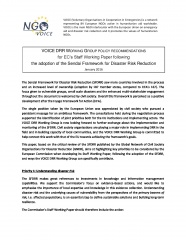
VOICE DRR WG Input to the European Commission Staff Working Paper following the adoption of the Sendai Framework for Disaster Risk Reduction
29 January 2016VOICE position papersThis paper, based on the critical review of the SFDRR published by the Global Network of Civil Society Organisations for Disaster Reduction (GNDR), aims at highlighting key priorities to be considered by the European Commission when developing its Staff Working Paper, following the adoption of the SFDRR, and ways the VOICE DRR Working Group can specifically contribute. -
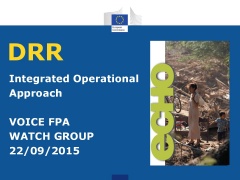
-
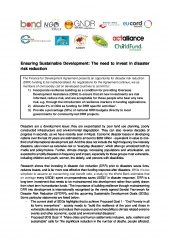
Joint CSO statement on DRR for FFD
06 July 2015VOICE position papersVOICE together with Civil society networks jointly made recommendations ahead of the Finance For Development Agreement; since it presents an opportunity for disaster risk reduction (DRR) funding to be institutionalised. We call on developed countries to commit to:
1) Incorporate resilience building as a condition for providing OverseasDevelopment Assistance (ODA) to ensure that all new investments are risk informed, reduce risk, and are acceptable for those people who bear any new risk. e.g. through the introduction of resilience markers in funding applications.
2) Allocate 5% of ODA as funding for DRR specific activities
3) Provide a percentage (50%) of national DRR budgets directly to local governments for community-led DRR projects. -
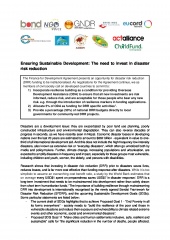
ENSURING SUSTAINABLE DEVELOPMENT: THE NEED TO INVEST IN DISASTER RISK REDUCTION - JOINT CSO STATEMENT
19 June 2015VOICE position papersThe Finance for Development Agreement presents an opportunity for disaster risk reduction (DRR) funding to be institutionalised. As negotiations for the Agreement continue, the members of civil society in this statement call on developed countries to commit to:
1) Incorporate resilience building as a condition for providing Overseas Development Assistance (ODA) to ensure that all new investments are risk informed, reduce risk, and are acceptable for those people who bear any new risk. e.g. through the introduction of resilience markers in funding applications.
2) Allocate 5% of ODA as funding for DRR specific activities.
3) Provide a percentage (50%) of national DRR budgets directly to local governments for community-led DRR projects. -
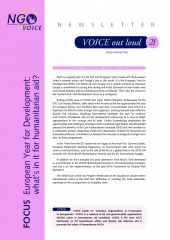
VOICE Out Loud 21: European Year for Development: what's in it for humanitarian aid?
21 May 2015VOICE out loudIn this issue, VOICE members address the advantages and challenges of development and humanitarian working together, looking at DRR, Core Humanitarian Standard, displacement in urban settings. With consultations on the World Humanitarian Summit ongoing, 50 humanitarian NGOs made a statement on humanitarian principles, while civil society coalitions came together with priorities for implementation of the Sendai Framework for Disaster Risk Reducation. We hear an update on the situation in Ukraine, and the views of the European Parliament standing rapporteur on humanitarian assistance, Mr. Guerrero-Salom MEP. -
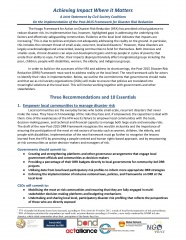
Achieving Impact Where It Matters - A joint statement by the civil society coalitions on the implementation of the post-2015 Framework for Disaster Risk Reduction
20 March 2015VOICE position papersThe Hyogo Framework for Action on Disaster Risk Reduction (HFA) has provided critical guidance to reduce disaster risk. Its implementation has, however, highlighted gaps in addressing the underlying risk factors and effectively safeguarding communities. In order to build on the successes of the HFA and address its shortcomings, the Post-2015 Disaster Risk Reduction (DRR) Framework must work to address reality at the local level. The new framework calls for actors to identify their roles in implementation. This Joint Statement outlines the commitments that governments should make and that civil society organizations (CSOs) will make to ensure that policies are translated into meaningful solutions at the local level. -
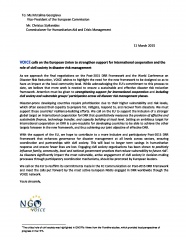
Open Letter To Commissioner GEORGIEVA and Commissioner STYLIANIDES on the Post-2015 DRR Framework Agreement
11 March 2015VOICE position papersVOICE calls on the European Union to strengthen support for international cooperation and the role of civil society in disaster risk management. -
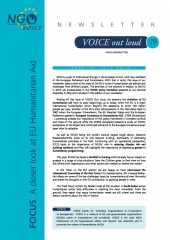
VOICE Out Loud 19: A closer look at EU humanitarian aid
26 September 2014VOICE out loudThis issue looks at the evolution of EU humanitarian aid, the European Consensus on Humanitarian Aid's value especially in conflicts and complex crises, DRR and resilience programming, gender in humanitarian aid, and the EU's funding for humanitarian aid. The ICRC shares their views on key humanitarian challenges and we get an update on the situation in South Sudan. -
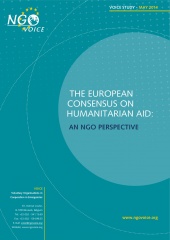
The European Consensus on Humanitarian Aid: An NGO Perspective - Report
21 May 2014VOICE studies and briefing papersThis study commissioned by VOICE presents an analysis of how EU Member States and NGOs have engaged with the Consensus and how it has informed Member States' decision-making and policies. By presenting findings from the view of NGOs, the study seeks to contribute to an understanding of what NGOs consider the crucial elements of the Consensus, and of EU humanitarian aid more broadly.

